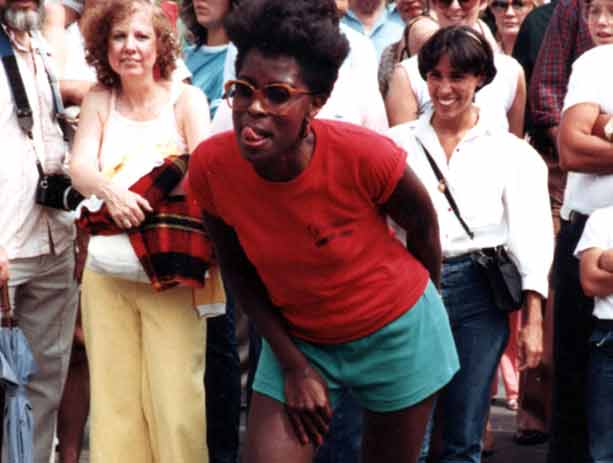
Kicking off last week Friday, February 3, and running throughout the month, ending on Thursday, February 23, BAMcinématek in Brooklyn, New York presents “One Way or Another: Black Women’s Cinema, 1970-1991.”
Last fall’s re-release of Julie Dash’s masterpiece “Daughters of the Dust” helped prompt a belated acknowledgement of how the industry failed to recognize a demand for more diverse points of view. Marginalized by institutional racism and sexism, black women filmmakers have struggled to gain a foothold in the film industry. This BAM series brings together the women who helped pave the way for Dash’s landmark film.
Opening the series on Friday was the iconic “Daughters of the Dust” (1991—Feb 3-5), Julie Dash’s dreamlike evocation of early-20th-century Gullah life (itself a key influence on what that would come after, like Beyoncé’s recent visual album “Lemonade” for example), a sumptuous celebration of folk traditions and black womanhood. In addition, rarely viewed shorts directed by Julie Dash were shown yesterday, February 5, and will be shown today, February 6; they are: “Four Women” (1975), “Illusions” (1982), “Praise House” (1991) and “Standing at the Scratch Line” (2016).
Also today, and again on February 15, Camille Billops’ fearlessly personal work is highlighted with screenings of “Suzanne, Suzanne”(1982), a portrait of a woman processing her abusive father and her drug addiction; “Finding Christa” (1991), an autobiographical record of the filmmaker’s reunion with the daughter she gave up for adoption; and “Take Your Bags” (1998), Billop’s examination of slavery and cultural theft.
Screening on February 7, the great Ruby Dee scripted and stars in “Zora is My Name” (1989), a tribute to visionary writer and folklorist Zora Neale Hurston.
On February 15, a second selection by celebrated film and television director, Neema Barnette, “Sky Captain” (1985), is a hip-hop-infused South Bronx fantasy tackling teen suicide with cinematic imagination.
“One Way or Another” includes two selections by esteemed filmmaker Kathleen Collins including the first feature-length drama directed by a black American woman, “Losing Ground” (Collins, 1982), which screened February 3-5, and Collins’ earlier featurette about three Puerto Rican brothers who are watched over by their father’s ghost in “The Cruz Brothers and Miss Malloy” (1980), screening on February 21.
A selection of short films pays homage to performers and artists on February 7 including “Remembering Thelma” (Sandler, 1981), profiling dancer Thelma Hill; sculptor Valerie Maynard in “Valerie” (Freeman, 1975); drag king/activist Stormé DeLarverie in “Stormé: The Lady of the Jewel Box” (Parkerson, 1987); dancer/choreographer Syvilla Fort in “Syvilla: They Dance to Her Drum” (Chenzira, 1979); and “Water Ritual #1: An Urban Rite of Purification” (McCullough, 1979) an experimental performance based film in Afro-Diasporic ceremonies.
“One Way or Another” integrates a range of historical, political and sexual themes. Black women and their bodies are explored in a program on February 16 with Zeinabu irene Davis’ “Cycles” (1989), and Cheryl Chisholm’s documentary “On Becoming A Woman” (1987). Jessie Maple’s “Twice as Nice” (1977), screening on February 8, explores the bond between twin sisters, and screens with Jackie Shearer’s docudrama “A Minor Altercation” (1989), that chronicles the tensions between two girls during the desegregation of Boston’s public schools.
Screening together on February 16 are two films exploring the plight of equal rights with Madeline Anderson’s “I Am Somebody” (1970) and Muriel Jackson’s “The Maids” (1985). Black women grapple with identity, beauty, and societal perception in filmmaker Alile Sharon Larkin’s “A Different Image” (1982), and Maureen Blackwood’s “Perfect Image?” (1988), screening together on February 19. Black families and neighborhoods are explored on February 18 with three selections including mixed docu-drama, “A Dream is What You Wake Up From” (1978, Bullard & Johnson), “A Sense of Pride: Hamilton Heights” (1977, Freeman), and the short film “Black Faces” (1970).
Other series highlights include Alile Sharon Larkin’s “Your Children Come Back to You” (1979) screening on February 15; Liz White’s “Othello” (1980) screening on February 13; Monona Wali’s “Grey Area” (1981) and two films by Fronza Wood’s—”Killing Time” (1979) and “Fannie’s Film (1979), all screening on February 13; Pearl Bowser, and Christine Choy’s “Namibia: Independence Now!” (1985) screening on February 20; Euzhan Palcy’s “Sugar Kane Alley” (1983— on February 23); Debra J. Robinson’s documentary “I Be Done Been Was Is” (1984— on February 4 & 9), and Elena Featherstone’s “Visions of the Spirit: A Portrait of Alice Walker” (1989— on February 8).
The contributions of black women to the art of animation are spotlighted on February 19 with an animation program featuring “Hair Piece: A Film for Nappy-Headed People” (Chenzira, 1984), a snappy satire on body image and beauty standards focusing on African-American hair; “Zajota and the Boogie Spirit” (Chenzira, 1990), a rhythmic celebration of African dance; “Picking Tribes” (Sharp, 1988), about a young girl navigating her identity as a black Native American; and “A Powerful Thang” (Davis, 1991), an inventive mix of live-action and animation exploring sex, love, and relationships.
Closing out the series is the series namesake, “One Way or Another” (“De Cierta Manera,” 1974) on February 18. Pioneering Afro-Cuban filmmaker Sara Gómez’s radical narrative-documentary hybrid delivers a complex critique of regressive machismo in Castro’s Cuba.
“One Way or Another” is co-programmed by BAMcinématek’s Nellie Killian and Michelle Materre; founder, host-producer, Creatively Speaking Film Series; Associate Professor of Media Studies and Film at The New School.
For a full schedule, visit BAM’s website http://www.bam.org/.
